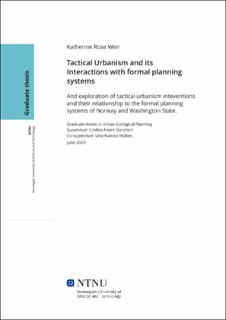| dc.description.abstract | This thesis explores the relationship between instances of tactical urbanism and the formal planning systems that are in place in the cities they take place in. The research seeks to fill the gaps in research for how specific planning systems interact with tactical urbanism interventions on the local scale. To this end, the research is focused on four cities that operate under similar planning systems but with different cultural and economic contexts. A theoretical understanding of the contemporary planning systems and existing frameworks for tactical urbanism is explored in the literature section. The context of the overarching planning systems and process is provided as well as a detailed account of the methodology before each case is introduced first by the relevant formal planning process relating to each case. The following research was conducted through interviews with individuals who have been involved to some degree in tactical urbanism interventions in each study city. Each case also included a site visit and a follow-up examination of secondary data that was referenced during the interview.
The cases explored are each unique in its interactions with the formal system. The interventions were either implemented for formally adopted by the formal planning bodies, or they tolerated/ignored or downright rejected by the formal planning authorities in the city. A significant finding was that the individuals who were involved in the interventions were all able to be considered privileged rather that socially or economically disenfranchised. The implications of this research are that there are ways forward for tactical urbanism to become an effective tool for co-creation, but a more in-depth study focused on the interactions between the truly disadvantaged who are engaging in tactical urbanism and how they interact with the formal planning bodies would be beneficial. | |
